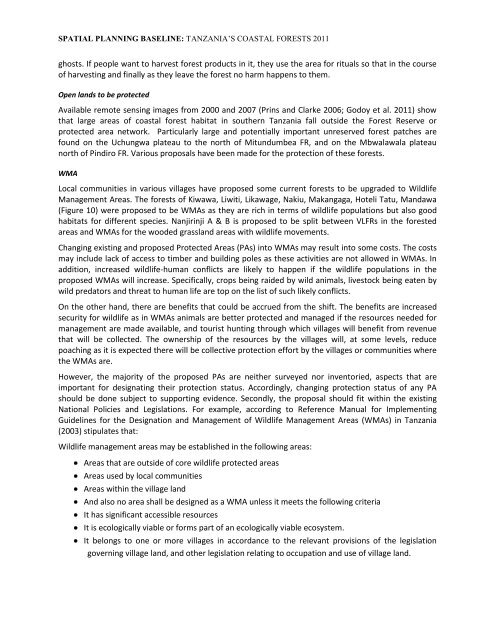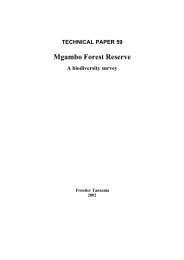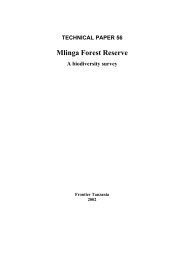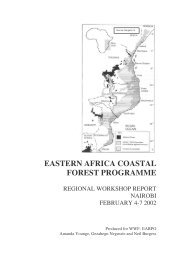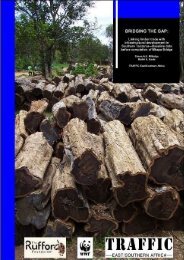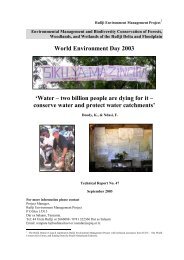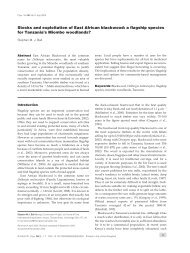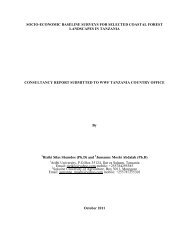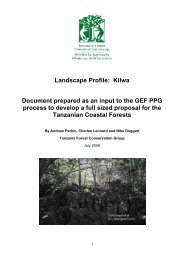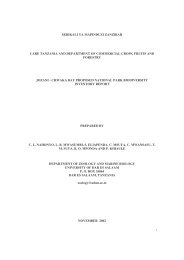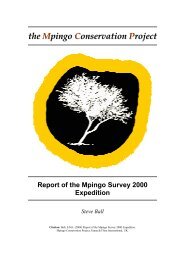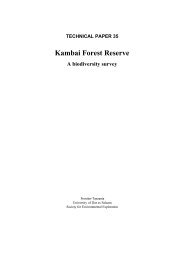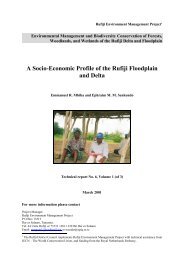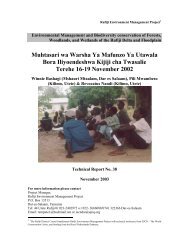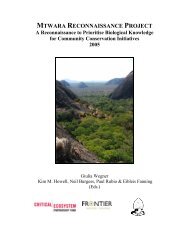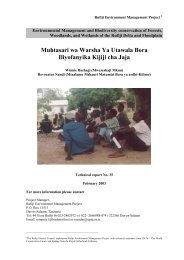Neil D. Burgess, Paul Harrison, Peter Sumbi, James Laizer, Adam ...
Neil D. Burgess, Paul Harrison, Peter Sumbi, James Laizer, Adam ...
Neil D. Burgess, Paul Harrison, Peter Sumbi, James Laizer, Adam ...
You also want an ePaper? Increase the reach of your titles
YUMPU automatically turns print PDFs into web optimized ePapers that Google loves.
SPATIAL PLANNING BASELINE: TANZANIA’S COASTAL FORESTS 2011<br />
ghosts. If people want to harvest forest products in it, they use the area for rituals so that in the course<br />
of harvesting and finally as they leave the forest no harm happens to them.<br />
Open lands to be protected<br />
Available remote sensing images from 2000 and 2007 (Prins and Clarke 2006; Godoy et al. 2011) show<br />
that large areas of coastal forest habitat in southern Tanzania fall outside the Forest Reserve or<br />
protected area network. Particularly large and potentially important unreserved forest patches are<br />
found on the Uchungwa plateau to the north of Mitundumbea FR, and on the Mbwalawala plateau<br />
north of Pindiro FR. Various proposals have been made for the protection of these forests.<br />
WMA<br />
Local communities in various villages have proposed some current forests to be upgraded to Wildlife<br />
Management Areas. The forests of Kiwawa, Liwiti, Likawage, Nakiu, Makangaga, Hoteli Tatu, Mandawa<br />
(Figure 10) were proposed to be WMAs as they are rich in terms of wildlife populations but also good<br />
habitats for different species. Nanjirinji A & B is proposed to be split between VLFRs in the forested<br />
areas and WMAs for the wooded grassland areas with wildlife movements.<br />
Changing existing and proposed Protected Areas (PAs) into WMAs may result into some costs. The costs<br />
may include lack of access to timber and building poles as these activities are not allowed in WMAs. In<br />
addition, increased wildlife-human conflicts are likely to happen if the wildlife populations in the<br />
proposed WMAs will increase. Specifically, crops being raided by wild animals, livestock being eaten by<br />
wild predators and threat to human life are top on the list of such likely conflicts.<br />
On the other hand, there are benefits that could be accrued from the shift. The benefits are increased<br />
security for wildlife as in WMAs animals are better protected and managed if the resources needed for<br />
management are made available, and tourist hunting through which villages will benefit from revenue<br />
that will be collected. The ownership of the resources by the villages will, at some levels, reduce<br />
poaching as it is expected there will be collective protection effort by the villages or communities where<br />
the WMAs are.<br />
However, the majority of the proposed PAs are neither surveyed nor inventoried, aspects that are<br />
important for designating their protection status. Accordingly, changing protection status of any PA<br />
should be done subject to supporting evidence. Secondly, the proposal should fit within the existing<br />
National Policies and Legislations. For example, according to Reference Manual for Implementing<br />
Guidelines for the Designation and Management of Wildlife Management Areas (WMAs) in Tanzania<br />
(2003) stipulates that:<br />
Wildlife management areas may be established in the following areas:<br />
Areas that are outside of core wildlife protected areas<br />
Areas used by local communities<br />
Areas within the village land<br />
And also no area shall be designed as a WMA unless it meets the following criteria<br />
It has significant accessible resources<br />
It is ecologically viable or forms part of an ecologically viable ecosystem.<br />
It belongs to one or more villages in accordance to the relevant provisions of the legislation<br />
governing village land, and other legislation relating to occupation and use of village land.


